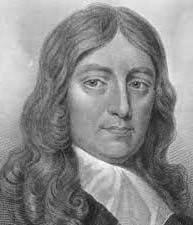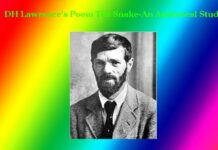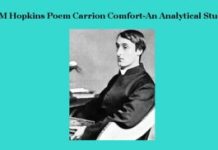J Milton | Hail Holy Light | Critical Analysis
John Milton Hail Holy Light a Critical Analysis
J Milton | Hail Holy Light | Critical Analysis
‘Hail Holy Light’ is an extract from John Milton’s Paradise Lost Book-III. In this extract, the poet makes an earnest invocation to God asking for His help and guidance in writing out his magnum opus ‘The Paradise Lost. For a better understanding of this piece of poetry we can divide it into two parts:
The first twenty-two lines of the poem contain the poet’s invocation of Holy Light and there it is said that Holy Light is the offspring of God. It is co-eternal, that is–as eternal as God because God is light. Here the poet has made a Biblical reference to the creation of the world. God has enveloped the world like a mantle. The poet says that there is an immeasurable space covered by the nether world of Hell and the vast empty region of chaos. (Here the poet says what he has described in the Paradise Lost Book No-I & II). On his return to the real world of Light in Book –III, the poet is able to feel light but he remains bereft of the sign of light because of his blindness.
In the second part i.e. from line no. 23 to line no 55 the poet makes a digression from the main theme of his great work ‘The Paradise Lost’ and says about his own blindness. Here the poet laments that being bereft of eye-sight; he is unable to see the light of God. The ‘drop serene’ (a disease that caused Milton’s blindness, as said by his physicians) makes him blind. So he cannot enjoy beautiful natural objects. But his blindness cannot crush his spiritual ardor. He believes that his loss of eyesight is amply compensated for by his faith that the light of God would continue to shine on him. The poet admits that in spite of his sightlessness he can, with the help of the Muse (God), wander about in the world and can narrate the beauty of Nature by virtue of his inner vision. Here the poet recollects Homer (a Greek epic poet) and Thamysis (a Thracian poet) as well as Tiresias (seer of Thebes) and Phineus (king of Salmydessus) who were blind. But in spite of their blindness, they could perform huge tasks memorable in history. Milton wishes that he were equal to them not only in blindness but also in renown. His physical blindness has deprived him of enjoying the beauty of nature during different seasons of the year and also the cheerful contact with men in society. Yet the poet thinks that his physical blindness is not a curse; it is a blessing in disguise. Because he thinks it has opened up his inner vision. The poet, therefore, appeals to Holy Light (God) to irradiate his mind and heart so that he may see and tell about Heaven, hell and their spiritual inhabitants in his epic.
From the above analysis of the theme of the poem, we can come to the conclusion that it is primarily an autobiographical poem in which he tells about his own blindness and his submission to God’s grace shown to him. It also shows that John Milton was conscious of his own greatness as he compares himself with the ancient great poets.
The style of the poem (an extract of the Paradise Lost, Book-III) is grand as there is an abundant use of Biblical, mythological and historical (from Greek and Latin) references and allusions such as-
‘And at the voice of God as with a mantle didst invest
The rising world of waters, dark and deep
Won from the void and formless infinite.’ (Bible: Book of Genesis 1:4)
There are allusions and references to Homer, Thamysis, Tirisius, and Phineus from Greek literature and legends with whom the poet compares his own genius.
In spite of these Greek and Hebraic references, there are references to Mt. Sion, stygian pool, flowery brook etc.
Besides this, there are images of a wakeful bird, an orphan lyre, a state of chaos etc. which has imparted a universal poetic appeal to this piece of poem.
To conclude it is to say that ‘Hail, Holy Light’ is an extract of Milton’s great epic ‘The Paradise Lost’ dealing with the theme of blindness written in grand style. 0 0 0.
Hail Holy Light
You May Like:
- ‘Poetry is the Criticism of LIfe’ Mathew Arnold-An Explanation
- Contributions of S T Coleridge to the History of Literary Theory and Criticism
N. B. The article ‘Hail Holy Light’ originally belongs to the book entitled ‘Critical Essays on English Poetry‘ by Menonim Menonimus.
Hail Holy Light
Books on Literary Criticism by M. Menonimus:
- World Short Story Criticism
- World Poetry Criticism
- World Drama Criticism
- World Novel Criticism
- World Essay Criticism
- Indian English Poetry Criticism
- Indian English Poets and Poetry Chief Features
- Emily Dickinson’s Poetry-A Thematic Study
- Walt Whitman’s Poetry-A Thematic Study
- Critical Essays on English Poetry
- Tawfiq al-Hakim’s Novel: Return of the Spirit-An Analytical Study
- Tawfiq al-Hakim’s Novel: ‘Yawmiyyat Naib Fil Arayaf’-An Analytical Study
- Analytical Studies of Some Arabic Short Stories
- A Brief History of Arabic Literature: Pre-Islamic Period (500 AD-622 AD)
- A Brief History of Arabic Literature: Early Islamic Period (622 AD-661 AD) …
Related Search:
- John Milton Hail Holy Light
- John Milton Hail Holy Light Analysis
- Paradise Lost: Blending of Reformation and Renaissance
- Puritan and Classical Elements in Milton











